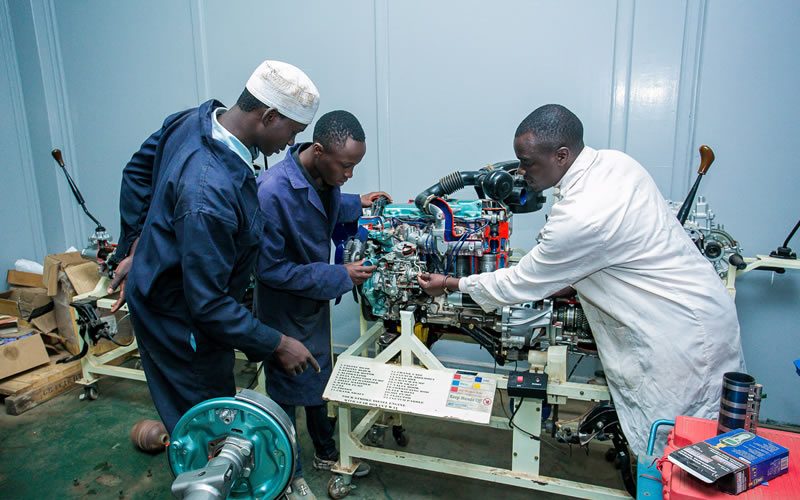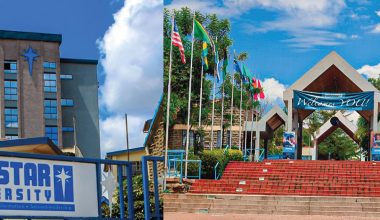Knowing the NITA courses and fee structure is very important if you’re looking forward to studying at NITA in Kenya.
The National Industrial Training Authority (NITA) course is a well-known course in Kenya that is committed to improving the quality and efficacy of industrial training. NITA offers a wide range of courses that cater to individuals in the formal and informal sectors through proficiency, skills upgrading, artisan, and tailor-made programs.
NITA offers its courses in its five industrial training centers nationwide. These branches are: NITA Athi River, NITA Kisumu, NITA Mombasa, NITA Nairobi, and NITA Textile Training Institute.
Additionally, NITA is the examining body for all of its courses, guaranteeing the legitimacy and standardization of training across industries.
In this article, we will list the courses NITA offers, as well as their fee structure and requirements.
Table of contents
What is NITA
The Industrial Training (Amendment) Act of 2011 created the National Industrial Training Authority (NITA), a governmental organization whose mission is to provide a sufficient supply of appropriately qualified labor at all industry levels by promoting the highest standards in the effectiveness and quality of industrial training in Kenya.
The Authority is headquartered in Nairobi and operates five industrial training centers (NITA Textile Training Institute, NITA Nairobi, NITA Mombasa, NITA Kisumu, and NITA Athi River).
The centres offer many industry-focused courses for workers in the formal and informal sectors. Proficiency courses, skill upgrading courses, artisan courses like Paterson Arts and Science courses, and custom courses are among the short and long programs offered by the courses. The Centers include training spaces, workshops, full-board accommodations, and recreational facilities.
See also: Strathmore University Courses | Requirements and Fees
Functions of NITA
The Industrial Training (Amendment) Act, 2011’s Section 3A defines the Authority’s responsibilities. As a result, the Authority is in charge of:
- Assessing and gathering fees and levies for industrial training;
- Among instructors who have registered under the Act’s section 7C; creating curricula for industrial training
- Integrating data from the labor market into the best skill development
- Standardizing credentials of competence and curricula.
- Evaluating industrial training, assessing vocational competencies, and issuing certifications, such as those from the Government Trade Test
Equating certificates
The Board finds it suitable or desirable to associate or collaborate with any other body or organization, both inside and outside of Kenya, to achieve the goals for which the Authority was founded.
NITA Core Values
Foster learning is guaranteed to be high-caliber, as are certification and trustworthy assessments that consider a person’s abilities, knowledge, values, and attitudes.
- Equity and access: Provide chances for everyone to learn new skills at any stage of life, focusing on vulnerable populations, women, and young people in particular.
- Reactivity, relevance, and adaptability: Cultivate a highly qualified labour force and entrepreneurs who are pertinent to the labour market’s demands now and in the future.
- Lifelong learning focuses on developing transferable, applicable, and learner-beneficial skills.
- Public-Private Partnerships: These help businesses and educators work together.
- Diversity of skills: recognize, value, organize, and display the breadth and depth of abilities
- Innovation and dynamism: they encourage and reward progress by welcoming change in all areas for advancement.
- Flexibility: improves portability and movement
- Choice, competition, and accountability—eliminate the difference between public and private delivery methods and emphasize results and performance.
See also: Official List Of Mechanical Engineering Courses In Kenya | Requirements And Fees
NITA Department and Courses
NITA offers several kinds of courses in its five departments. Here is the list of the departments and their courses.
Automotive Department
- EFI Diagnostics
- Engine Repair and Service
- Motor Vehicle Electricals and Electronics
- Motor Vehicle Mechanics
- Motorcycle and Small Engines
- On-board Diagnostics and Electronic Diagnostics of Vehicles (OBD)
- Panel Beating and Spray Painting
- Vehicle Upholstery
ICT Department
- MS Office Packages and Internet
- Data Communication and Computer Networks
- Entrepreneurship and Soft Skills
- MS Publisher, Adobe Pagemaker
- Computer Hardware Maintenance, Installation, and Repair
- Introduction to Computer and Operating Systems
- Industrial AutoCAD
- Computer Programming
- Web Development and Graphics Design
- Accounting Packages
- Microprocessor Technology
Electrical Department
- Electrical Wireman
- Solar Power Installation
- Motor Rewinding
- Power Generator Repair and Maintenance
- Electronic Mechanics (Charge Controllers, Inverters, Radio, TV, DVD, CCTV)
- Electrical Installation and Wiring
- Motor Control
- Mechanical Department
- Arc Welding
- CNC Lathe and Milling Machining
- Filter and Mechanical Maintenance
- Gas Welding
- General Fitting
- High-Pressure Welding
- MIG and TIG Welding
- Turning/Machining (Lathe, Milling, and Shaping)
- Welding and Fabricating
See also: List of Hospitality Courses in Kenya | Requirements and Fees
Building Department
- Block Making
- Cabinet Maker and Polishing
- Carpentry and Joinery
- Leatherwork
- Masonry
- Painter/Decorator
- Plumbing and Pipefitting
- Polishing
- PVC Panels Ceiling
- Shoemaking
- Signwriting
- Tiling
NITA Short Skill Upgrading Courses (SUG)
- Arc Welding
- Carpentry & Joinery/Cabinet Making
- Electrical Installation
- Electronics Mechanic
- Fitter General
- Gas Welding
- Machinist (Lathe, Milling, Shaping)
- Masonry/Tiling/Block Making
- Motor Controls
- Motor Rewinding/Power Generators Repair & Maintenance
- Motor Vehicle Electrician
- Motor Vehicle Mechanics
- Painter/Decorator/Polishing
- Panel Beating and Spray Painting
- Plumbing/Pipe Fitter
- Programmable Logic Controllers (PLC)
- Solar Installation
- TI (Technical Instructor)
- Vehicle Upholstery
See also: 15 Best Nursing Courses in Kenya and Qualifications PDF.
NITA Course Requirements and Duration
Here are the course durations and entry requirements for admission into the various NITA programs across its institutions in Kenya:
Artisan Courses:
Duration: Up to 5 terms
Entry Requirements: KCPE certificate or its equivalent
Craft Courses:
Duration: 5 terms
Entry Requirements: D- (minus) in KCSE or equivalent
Skill Upgrading and Tailor-made Courses:
Duration: 6 weeks (negotiable)
Entry Requirements: Recognition of prior learning, Government trade test, or any other recognized qualifications
Craft Proficiency Courses:
Levels: Preliminary, Intermediate, and Final
Trainees in regular craft and artisan courses must complete 3 months of in-centre training and 6 months of in-plant attachment before certification at each level.
To obtain certification at each level, regular craft and artisan course trainees must undergo 3 months of in-centre training and six months of in-plant attachment.
See also: Utalii College Courses and Qualifications | 2024 Fees
NITA Intakes
NITA intakes are usually conducted every year in January, May, and September and twice a term for the short courses.
NITA Fees Structure
These are the statutory fees required upon admission for NITA courses
| Course | Level 1 (ksh.)Advertisements | Level 2 (ksh.) | Level 3 (ksh.) |
| Crafts proficiency | 20,800.00 | 18,500,00 | 18,500,00 |
| Industrial Artisan | 20,800.00 | 18,500,00 | 18,500,00 |
| Skill Upgrading | 11,500.00 | 9,250.00 | 11,550.00 |
| Specialized courses in electrical ie solar PV &PLC | 2 weeks, ksh. 25,000 or negotiable | ||
| Specialized Tailor courses ( Mechanical, automotive, leather | Negotiable | ||
| ICT courses | Negotiable |
NITA Accommodation
NITA Nairobi has enough hostels in the compound for male and female trainees capable of accommodating more than four hundred trainees. They charge the following costs for the use of the hostels;
Four Weeks – Ksh. 8,500.00
Six Weeks – Ksh. 12,250.00
One Term – Ksh 25,000.00
Other Fees Include:
Registration Fees – Ksh 500
Caution Money – Ksh 1,000
Student ID – Ksh 300
Application Fees – Ksh 500
The above fees are not permanent and are subject to change at NITA’s sole discretion, so students are advised to contact NITA for clarification and more information.
Responsibilities of NITA
Here are the list of responsibilities been done by NITA:
- Management and Supervisory training; Apprenticeship Training, Craft, Technician (Skill-Upgrading)
- Indentured learners,
- National Industrial Attachment Programmes, Curriculum development,
- Trade testing and certification,
- Inspection of training providers;
- Administration of Industrial Training Levy Fund
- Administration of the five Industrial Training Centres
How to Apply for the NITA Grade Test
The National Industrial Training Authority (NITA) is crucial to advancing worker training and skill development.
In Kenya, Sensei College is an authorized NITA-grade testing facility. One of its main responsibilities is Conducting Grade Tests, which evaluate a person’s skill and competency in a variety of trades.
Applying for an NITA Grade Test is important if you want to improve your abilities and qualifications. This detailed manual will guide you through the steps involved.
Understand the NITA Grade Tests
NITA Grade Tests aim to assess your theoretical knowledge and practical abilities in particular trades. These crafts include everything from tailoring and hair styling to electrical and plumbing repair. The examinations are divided into several grades, usually Grades III, II, and I, where Grade I is the most difficult and Grade III is the entry-level.
Check Your Abilities
Before applying, make sure you meet the requirements for the particular grade test you plan to take. Candidates for Grade III exams typically require some basic knowledge or informal prior trade training.
Candidates must have passed the previous grade or have comparable job experience to be considered for Grades II and I.
Gather Necessary Documents
You’ll need several documents to complete your application:
A copy of your national ID or passport
Passport-sized photos
Certificates of prior training or relevant work experience
Proof of payment for the test fee
Choose a Trade and Grade
Decide on the specific trade and the grade level you want to be tested on. You can find a list of trades and descriptions on the NITA website or through their offices.
Register for the Test
- Online Registration: Visit the NITA Website: Go to the official NITA website and navigate to the Grade Test section.
- Create an Account: If you don’t already have one, you must create one.
- Fill in the Application Form: Complete the online application with your details, chosen trade, and grade.
- Upload Documents: Upload the required documents, including your ID, photos, and certificates.
- Pay the Fee: Follow the instructions to pay the test fee. Payment can usually be made via mobile money (M-Pesa), bank transfer, or other specified methods.
- Submit Application: After completing the form and payment, submit your application.
- Manual Registration: Visit NITA Offices: Go to the nearest NITA office or an authorized registration centre.
- Collect Application Form: Obtain a physical application form.
- Fill and Submit the Form: Complete the form and attach the required documents.
- Submit Application: Submit your completed form and documents to the NITA office.
Prepare for the Test
After registration, prepare thoroughly for the test’s practical and theoretical aspects. Utilize resources such as training manuals, past papers, and practical sessions. If possible, enrol in a training program to refine your skills.
Sit for the Test
Bring your ID and acceptance letter to the testing location on the designated day. The test usually has two parts: a written exam and a practical evaluation. Perform as well as you can according to the examiners’ instructions.
Await the Final Result
NITA will assess your performance after the test. Usually, the results are made public in a few weeks. Your results are available for viewing at the office where you registered or on the NITA website. A certificate with their grade and trade is given to the successful candidates.
FAQs
The National Industrial Training Authority, Kisumu (NITA Kisumu) Centre offers courses for people in formal and informal employment and school leavers on a full-time and part-time basis.
Nita regulates and manages the industrial training of technical persons engaged in the industry through Apprenticeship, skill upgrading, and indentured leadership schemes.
The National Industrial Training Authority (NITA) offers awesome industrial attachment opportunities.
NITA Mombasa is the lead training provider of engineering apprenticeships and skills training for Mechanical, Automotive, Civil and Building,
Yes, it is.
Conclusion
Knowing the NITA courses and fee structure is an important process that requires careful preparation and adherence to guidelines.
By going through this article, you can successfully navigate the application process and move forward in your chosen course with recognized skills and certification.
Reference
- logicpublishers.com– NITA List of Accredited Courses 2024 | Requirements & Fees
- victormatara.com– National Industrial Training Authority NITA Courses And Fee Structure






